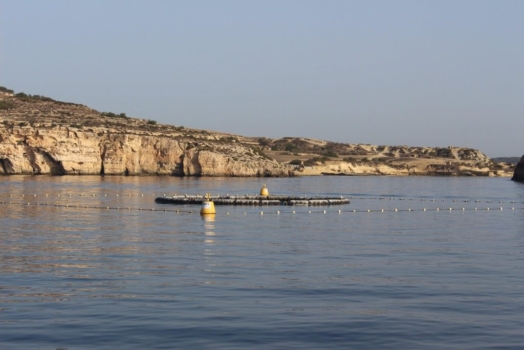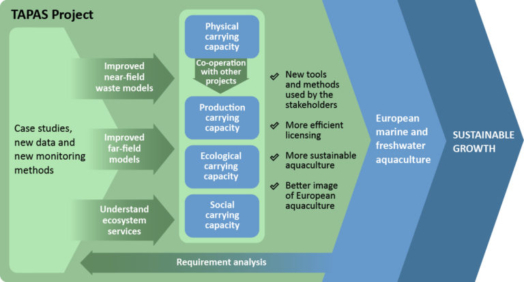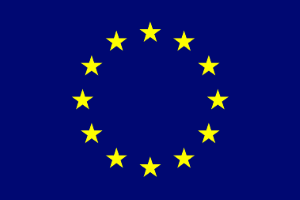A FEW WORDS ABOUT US
Aquaculture is a major food production subsector which will play a major role in filling the growing seafood supply gap, estimated to be of the order of 47.5 million tons by 2050. However, aquaculture cannot be practiced everywhere; it requires a particular set of natural, social and economic resources which must be used wisely if the development of the sector is to be sustainable. Appropriate environmental characteristics, good water quality, well-understood social interactions and use of inland and coastal resources are essential to maintaining in existing and future aquaculture systems. Consequently, suitable zoning, selection of sites and application of carrying capacity are among the most important issues for the future success of European aquaculture, and also predicate the need for sustainability, resilience and best practice guidelines, as provided by the Ecosystem Approach to Aquaculture.
The four-year Horizon 2020 TAPAS research project, which started in March 2016, aims to consolidate the environmental sustainability of European aquaculture by developing tools, approaches and frameworks to support EU Member States in establishing a coherent and efficient regulatory framework, implementing the Strategic Guidelines for the sustainable development of European aquaculture and delivering a technology and decision framework for sustainable growth.
Through collaboration and participation of RTDs with stakeholders and end-users, partners will identify sustainability requirements set by existing regulatory and licensing approaches, and identify possible bottlenecks hampering cost-efficient practices. This will be achieved by reviewing present regulations and license practices at national and EU level. The practical use of existing tools for carrying capacity assessment, EIA, and management among different users also will be reviewed to identify the utility of existing sustainability tools and the need for new decision support methods and frameworks.
The critical analysis of existing tools and technologies will provide a base to develop new models and decision systems appropriate for a farm, water body, and regional scale studies as well as for polyculture and integrated systems (IMTA). These new tools will target offshore, coastal and inland aquaculture throughout the EU.
TAPAS will also assess the environmental services provided by European aquaculture through an ecosystems services cascade framework that, by the combination of an ecosystem and economic modeling, will provide metrics for assessing the quality, quantity, and values of potential benefits obtained from aquaculture.
To strengthen management practices and develop cost-efficient management tools, the project will evaluate existing and develop new in situ real-time surveillance technologies for physical, ecological and chemical water quality parameters, including a use of novel bio- and optical sensors… These methods will be tested through a series of case studies across all aquaculture sectors and practices to continuously monitor key parameters for resource use and impact assessment of aquaculture.
Title: Tools for Assessment and Planning of Aquaculture Sustainability
Call: H2020-SFS-2015-2
Topic: SFS-11b-2015 – Consolidating the environmental sustainability of European aquaculture
Type of Action: RIA
Duration: 48 months
Project Start Date: 01/03/2016
Project End Date: 29/02/2020
Project outputs will be incorporated into a TAPAS Aquaculture Sustainability Toolbox, based on existing and newly developed models and approaches. The second key objective is to create a flexible TAPAS Decision Support Framework (TAPAS-smart) to investigate carrying capacity categories of freshwater and marine aquaculture in terms of recent regulation, policies, and indicators of sustainability while remaining focused on the most relevant problems of the aquaculture industry in the EU.
Dissemination and outreach activities of TAPAS will promote uptake of the toolbox and decision support system through tailor-made actions to ensure their continued use by stakeholders beyond the lifetime of the project. Partners will interact through the project advisory board with national and EU level producer organizations, regulators and certifiers to influence implementation of TAPAS outcomes. TAPAS will also cooperate with political fora in the field of aquaculture licensing to understand and facilitate harmonization at the various scales and levels. Outreach activities will also help to improve the image of European aquaculture with the public and consumers through relevant local, national and international media and targeted training events, as well as targeted communication through a project website and social media.



